|
|
|
Sort Order |
|
|
|
Items / Page
|
|
|
|
|
|
|
| Srl | Item |
| 1 |
ID:
133647
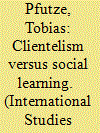

|
|
|
|
|
| Publication |
2014.
|
| Summary/Abstract |
Most research on the effects of international migration on democratic institutions in sending countries focuses on how emigration changes the civic and democratic values of those left behind. Little attention has been given to how the additional income provided by migrant remittances alters the incentive structure of the political actors involved and how this will affect political outcomes. This paper develops a voting model that accounts for the effect of higher income through remittances and shows that its expected effects on voter turnout patterns differ in important ways from those of improved civic values. Taking these predictions to the data, it is shown that, for the case of Mexican municipal elections over the year 2000-2002 period, the empirical evidence strongly supports the notion that international remittances had a positive effect on electoral competitiveness in Mexico by reducing the clientelistic power of the formerly dominant state party (Institutional Revolutionary Party). This result is robust to the use of instrumental variables.
|
|
|
|
|
|
|
|
|
|
|
|
|
|
|
|
| 2 |
ID:
133643
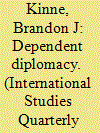

|
|
|
|
|
| Publication |
2014.
|
| Summary/Abstract |
Diplomatic recognition is an essential tool of statecraft but remains largely unanalyzed by political scientists. Two recent trends in diplomatic practice raise notable puzzles: (i) use of diplomatic ties to signal (dis)approval of a regime or its policies, based largely on cues from diplomatic partners, and (ii) reliance on diplomatic missions as a means of securing prestige in the international system. I argue that both trends are the result of network influences. States face resource constraints and must choose diplomatic partners wisely, but they lack complete information about the risks and benefits of extending diplomatic recognition. To solve this informational dilemma, they condition recognition on the diplomatic activity of others. First, states send missions to countries that host missions from their own diplomatic partners, which increases the strength of diplomatic signals and reduces political risks. Second, states send missions to countries that host large numbers of missions in general (that is, "prestigious" countries), which increases their capacity for information gathering. In general, a state's decision to extend or retract diplomatic recognition depends heavily on the decisions of other states. Employing novel network methodologies, I show that these endogenous network influences are among the most consistent and substantively powerful determinants of diplomatic recognition.
|
|
|
|
|
|
|
|
|
|
|
|
|
|
|
|
| 3 |
ID:
133644
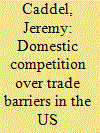

|
|
|
|
|
| Publication |
2014.
|
| Summary/Abstract |
As governments lower traditional tariffs, they may use non-tariff barriers, such as antidumping (AD) and countervailing duty (CVD) laws, to protect domestic industries. Research on the US International Trade Commission (ITC), an independent agency responsible for adjudicating AD/CVD claims, finds mixed evidence of political influence in these cases. However, this research focuses predominately on the political influence of the petitioning industry. Applying theories of bureaucratic oversight, I posit that the ITC must be receptive both to petitioners and to firms that oppose trade barriers. Using an original data set compiled from ITC records of witness testimony in these cases, I demonstrate that domestic opposition to an AD/CVD petition has a significant effect on ITC decisions. Moreover, members of Congress actively intervene on both sides of AD/CVD petitions and have some influence on ITC decisions. These results suggest that AD/CVD politics in the United States is better understood as a contest between competing domestic interests than a captured bureaucracy providing rents to protectionist interests.
|
|
|
|
|
|
|
|
|
|
|
|
|
|
|
|
| 4 |
ID:
133646
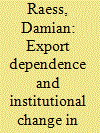

|
|
|
|
|
| Publication |
2014.
|
| Summary/Abstract |
This article explores the adjustment of wage bargaining institutions to international trade in Germany. Embracing IPE as opposed to CPE lenses yields a novel interpretation of change in the institution of wage bargaining. Export dependence of a sector, we argue, has destabilizing effects for industry-wide bargaining by sparking an intra-sectoral cleavage between domestic- and export-oriented enterprises. Specifically, the greater the degree of export dependence of a sector, the greater the degree to which domestic-oriented enterprises within that sector will abandon collective bargaining. We also explain how workplace employee representation through works councils mitigates this effect, such that the presence of works councils helps domestically oriented firms to hold to collective bargaining agreements in the face of a sector's deepening exposure to export markets. These claims find empirical support in the history of labor relations developments in the metal industry and, especially, in extensive analysis of a cross-section of establishments. Our findings attribute major responsibility to the firms driving globalization for undermining collective bargaining institutions and suggest that economic globalization is a cause of dualization. In all, the article provides fresh ammunition for a version of globalization-induced institutional convergence. [Correction added after online publication on May 28, 2014: "conversion" changed to "convergence" in preceding sentence.]
|
|
|
|
|
|
|
|
|
|
|
|
|
|
|
|
| 5 |
ID:
133653
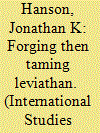

|
|
|
|
|
| Publication |
2014.
|
| Summary/Abstract |
Empirical research in the New Institutional Economics tradition has concentrated on the degree to which institutional constraints on rulers protect property rights and foster growth through private investment. This view of institutions is overly narrow, neglecting the role of state capacity in particular. Both state authority and constraints on rulers matter for economic performance, but the relative strength of these effects depends upon a country's distance from the frontier of the world economy. Tests using a panel data set that covers up to 84 countries from the period 1960 to 2005 reveal that, in countries that have low Gross Domestic Product (GDP) per capita, constraints on rulers in the form of checks and balances affect neither the rate of productivity growth nor the growth of capital stock per worker. Basic state authority, however, has a strong, positive effect on both of these outcomes. The story is different for advanced industrial economies, where the effects of checks are positive, especially with respect to productivity growth. Institutional checks on rulers are thus not an agent of investment-based growth but support continued growth based upon innovation at the leading edge.
|
|
|
|
|
|
|
|
|
|
|
|
|
|
|
|
| 6 |
ID:
133651
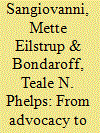

|
|
|
|
|
| Publication |
2014.
|
| Summary/Abstract |
We analyze forms of environmental activism that eschew the "information and socialization" politics typically associated with Transnational Advocacy Groups (TAGs) and instead favor direct, confrontational strategies, whose aim is to enforce international law. While mainstream TAGs typically seek influence through norm entrepreneurship, lobbying or "naming and shaming", what we label Direct Enforcement (DE) intervenes directly to halt (purportedly) illegal practices by states and private actors. DE activism has been most visible in transnational campaigns to protect endangered marine species, where environmental groups have resorted to damaging equipment used for illegal fishing and boarding fishing boats to enforce maritime conservation law. Often branded as eco-terrorism, such confrontational strategies have been largely ignored by scholarly literature on transnational activism. We contend that DE merits closer attention by IR-scholars for two reasons. First, DE activism plays an important role in enhancing the compliance pull of international laws in an area-the global environment-where states often lack capacity and political will to enforce international agreements. Second, an analysis of DE-activism provides important insights about issue selection and relative campaign success under different structural circumstances, thereby expanding our understanding of transnational advocacy more generally.
|
|
|
|
|
|
|
|
|
|
|
|
|
|
|
|
| 7 |
ID:
133649


|
|
|
|
|
| Publication |
2014.
|
| Summary/Abstract |
Why do new EU democracies engage in multilateralism? The dominant explanation proposes that new democracies use international treaties to lock in domestic reforms. This article offers a novel explanation as to why new EU democracies participate in multilateral treaties. We argue that ratifying a treaty serves three external signaling purposes (recognition concerns, increasing strategic autonomy, and pleasing the European Union). We test our argument through a mix of quantitative and qualitative methods. First, we apply event history analysis. Drawing on a new ratification data set comprising 76 multilateral treaties, we illustrate the prominent role of new EU democracies in multilateralism as compared to other new democracies. Second, to assess the importance of external signaling in the decision to ratify multilateral treaties, we examine parliamentary ratification debates in selected Central and Eastern European countries. Third, we compare parliamentary discussions across European and non-European new democracies to demonstrate the different motives driving their approaches toward multilateralism.
|
|
|
|
|
|
|
|
|
|
|
|
|
|
|
|
| 8 |
ID:
133648
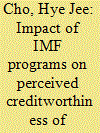

|
|
|
|
|
| Publication |
2014.
|
| Summary/Abstract |
This article examines whether the impact of International Monetary Fund (IMF) programs on the perceived creditworthiness of a country is conditional on government partisanship. Left-of-center governments tend to suffer from greater credibility problems in financial markets than right-wing governments, because they are typically believed to pursue expansionary policies and have less respect for debt obligations. Applying the conventional wisdom held as "Only Nixon can go to China," I argue that adopting IMF programs can benefit leftist governments more than other types of governments. The logic of the Nixon paradox implies that market-oriented reforms have greater credibility when implemented by a left-of-center party, whose ideologies do not accord well with the IMF's neoliberal policies, than when implemented by a right-wing party. This is because market participants interpret the action by a leftist government as driven more by a willingness to commit to market-oriented reform than by ideological affinity. Using sovereign credit rating data for almost 90 emerging market countries from 1980 to 2004, I find robust evidence consistent with the "Nixon-Goes-to-China" hypothesis. The findings suggest that adopting IMF programs improves the perceived creditworthiness of leftist governments, whereas no such benefit is found among non-leftist governments.
|
|
|
|
|
|
|
|
|
|
|
|
|
|
|
|
| 9 |
ID:
133652
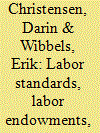

|
|
|
|
|
| Publication |
2014.
|
| Summary/Abstract |
Proponents often recommend high labor standards as a means of reducing inequality between and within countries. Opponents suggest that labor standards exacerbate international and domestic inequalities. In this paper, we forward a simple argument whereby the impact of higher labor standards on domestic inequality depends on a country's labor endowment. We hypothesize that where labor is abundant, higher standards will exacerbate inequality. Where labor is scarce, higher labor standards might lower inequality. In both cases, the impact of labor standards on inequality work through an employment and wage effect. Using newly available data on labor standards around the world from 1981 to 2000, we provide evidence largely consistent with our hypotheses. Higher labor standards do, indeed, exacerbate inequality in labor-abundant economies. On the other hand, higher labor standards lower inequality in labor-scarce economies. We discuss the implications of these findings for work on labor market insiders and outsiders as well as the political economy of development.
|
|
|
|
|
|
|
|
|
|
|
|
|
|
|
|
| 10 |
ID:
133645
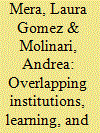

|
|
|
|
|
| Publication |
2014.
|
| Summary/Abstract |
This article studies the functioning of dispute settlement mechanisms in regional trade agreements (RTAs) and their interaction with multilateral trade institutions. We examine the determinants of formal dispute initiation in RTAs among South American countries. Using an original data set of RTA disputes, we investigate the impact of economic power disparities, domestic political factors, and previous experience on the decision of South American countries to initiate a dispute against a regional trade partner. Our analysis indicates that both power asymmetries and domestic political factors influence the likelihood of dispute initiation at the regional level. We also find strong support for our hypothesis that previous experience in dispute settlement increases the probability that a country will file a complaint against a regional trade partner using regional mechanisms. Perhaps more interestingly, our empirical analysis also uncovers important cross-institutional effects. Prior participation in WTO disputes increases the propensity of states to file complaints at the regional level.
|
|
|
|
|
|
|
|
|
|
|
|
|
|
|
|
| 11 |
ID:
133655
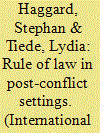

|
|
|
|
|
| Publication |
2014.
|
| Summary/Abstract |
This paper analyzes whether and to what extent countries reconstitute the rule of law following civil conflict. Drawing on an original data set of 47 cases in which conflict ended between 1970 and 1999, we find that the cessation of conflict has at best a modest effect on the rule of law. On average, countries revert to the pre-conflict rule-of-law status quo ante. In simple models, rule of law prior to the onset of conflict is the best indicator of post-conflict performance. Analysis of individual cases using structural break analysis shows that the cessation of conflict is not typically associated with an inflection in the rule of law; improvements are modest, take a long time, and fall far short of plausible thresholds for robust rule of law.
|
|
|
|
|
|
|
|
|
|
|
|
|
|
|
|
| 12 |
ID:
133656
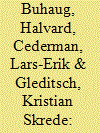

|
|
|
|
|
| Publication |
2014.
|
| Summary/Abstract |
Much of the recent research on civil war treats explanations rooted in political and economic grievances with considerable suspicion and claims that there is little empirical evidence of any relationship between ethnicity or inequality and political violence. We argue that common indicators used in previous research, such as the ethno-linguistic fractionalization (ELF) and the Gini coefficient for income dispersion, fail to capture fundamental aspects of political exclusion and economic inequality that can motivate conflict. Drawing on insights from group-level research, we develop new country-level indices that directly reflect inequalities among ethnic groups, including political discrimination and wealth differentials along ethnic lines. Our analysis reveals that these theoretically informed country profiles are much better predictors of civil war onset than conventional inequality indicators, even when we control for a number of alternative factors potentially related to grievances or opportunities for conflict.
|
|
|
|
|
|
|
|
|
|
|
|
|
|
|
|
| 13 |
ID:
133654
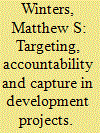

|
|
|
|
|
| Publication |
2014.
|
| Summary/Abstract |
If development projects are to be effective, a minimum requirement is that the funding reaches its intended destination. Yet the history of international development is replete with examples of this not happening. I argue that there will be fewer problems with corruption or other diversions of funding-which I jointly label capture-in more precisely targeted projects. More well-defined targeting results in superior accountability relationships because there is greater clarity of responsibility, clearer information about outcomes, and improved identifiability of stakeholders. I use an original cross-country, cross-project data set on the incidence of capture in World Bank-funded investment projects to test the theory. The data show a negative relationship between targeting and capture, and I demonstrate that this relationship is robust to a variety of specifications. In addition, I find that there is a higher baseline likelihood of project capture in countries perceived as more corrupt according to commonly used survey-based measures from Transparency International and the Worldwide Governance Indicators, cross-validating those measures and my own
|
|
|
|
|
|
|
|
|
|
|
|
|
|
|
|
| 14 |
ID:
133650
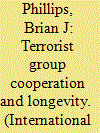

|
|
|
|
|
| Publication |
2014.
|
| Summary/Abstract |
Why do some terrorist groups survive considerably longer than others? The literature is just beginning to address this important question in a systematic manner. Additionally, and as with most studies of terrorism, longevity studies have ignored the possibility of interactions between terrorist groups. This article attempts to address these two gaps in the literature: the incomplete understanding of terrorist group survival and the tendency to assume that terrorist groups act independently. In spite of risks associated with cooperation, I argue that it should help involved terrorist groups mitigate mobilization concerns. More importantly, the impact of cooperation is conditioned by attributes of the country in which a terrorist group operates. Using new global data on terrorist groups between 1987 and 2005, I show that cooperation has the strongest effect on longevity in states where groups should have a harder time operating-more capable states and less democratic states. Interestingly, a group's number of relationships is more important than to whom the group is connected.
|
|
|
|
|
|
|
|
|
|
|
|
|
|
|
|
| 15 |
ID:
133642
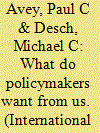

|
|
|
|
|
| Publication |
2014.
|
| Summary/Abstract |
What do the most senior national security policymakers want from international relations scholars? To answer that question, we administered a unique survey to current and former policymakers to gauge when and how they use academic social science to inform national security decision making. We find that policymakers do regularly follow academic social science research and scholarship on national security affairs, hoping to draw upon its substantive expertise. But our results call into question the direct relevance to policymakers of the most scientific approaches to international relations. And they at best seriously qualify the "trickle down" theory that basic social science research eventually influences policymakers. To be clear, we are not arguing that policymakers never find scholarship based upon the cutting-edge research techniques of social science useful. But policymakers often find contemporary scholarship less-than-helpful when it employs such methods across the board, for their own sake, and without a clear sense of how such scholarship will contribute to policymaking.
|
|
|
|
|
|
|
|
|
|
|
|
|
|
|
|
|
|
|
|
|